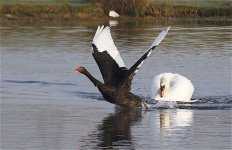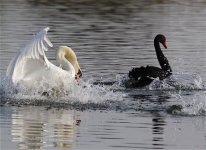-
Welcome to BirdForum, the internet's largest birding community with thousands of members from all over the world. The forums are dedicated to wild birds, birding, binoculars and equipment and all that goes with it.
Please register for an account to take part in the discussions in the forum, post your pictures in the gallery and more.
You are using an out of date browser. It may not display this or other websites correctly.
You should upgrade or use an alternative browser.
You should upgrade or use an alternative browser.
What birds could be introduced to the UK? (1 Viewer)
- Thread starter Yashca
- Start date
More options
Who Replied?
I seem to remember that the Duke of Bedford attempted to establish a wild budgie flock at Woburn in the 1950's - I expect that the majority ended up inside the local Sparrowhawk population....:eat:
I believe a population established itself in the Scillies in the 70s, then dwindles away again

Another possibility is Harris Hawk.
They are widely used by falconers and are the bird of choice for pest control and runway management. There are a number of escaped birds that seem to be surviving on their own. One just south of Lancaster has been there for a couple of years and resisted all attempts to catch it.
The only good point seems to be the escapees do seem to stay in the same areas so the chance of two meeting up is reduced.
They are widely used by falconers and are the bird of choice for pest control and runway management. There are a number of escaped birds that seem to be surviving on their own. One just south of Lancaster has been there for a couple of years and resisted all attempts to catch it.
The only good point seems to be the escapees do seem to stay in the same areas so the chance of two meeting up is reduced.
where i live in derbyshire there seem to be a few if not more harris hawks seen in the
wild every year the ones regularly seen are in areas where falconers release there birds for practice and the birds seen there are likely the same birds staying loyal to that area
i have on one or more occasions seen birds in these areas over the years it would
be interesting to know how many of these escaped birds are now sufficiently capable to live outdoors themselves across britain in the wild.
wild every year the ones regularly seen are in areas where falconers release there birds for practice and the birds seen there are likely the same birds staying loyal to that area
i have on one or more occasions seen birds in these areas over the years it would
be interesting to know how many of these escaped birds are now sufficiently capable to live outdoors themselves across britain in the wild.
redeyedvideo
It's like water off a duck's back!
As an example, black swans. Are we going to just let them increase, then realise they are starting to hybridise with our native swans and then go through costly risk assessment and eradication plans? or just get rid of the handful that are out there now very easily and quickly?
There's virtually no chance of this happening, Mute Swans are the larger and dominant species and the adult males won't tolerate the smaller Black Swan in their territory.
DEFRA are currently reviewing these and other non-native species in view of an eradication programme. I propose they start with mink and move on to conifers before destroying a harmless and beautiful creature.
Attachments
MJB
Well-known member
There's virtually no chance of this happening, Mute Swans are the larger and dominant species and the adult males won't tolerate the smaller Black Swan in their territory.
DEFRA are currently reviewing these and other non-native species in view of an eradication programme. I propose they start with mink and move on to conifers before destroying a harmless and beautiful creature.
When Black Swans become feral in the nothern hemisphere, they usually remain locked into the austral breeding cycle, which accounts for their failure to spread, the northern winter not being suited to raising young, but if sufficient numbers did adjust their breeding cycle, the species could become a problem, despite the dominance of Mute Swans.
The only long-lasting feral colony I know about in Europe was that in Vienna. It lasted for a good number of years until local skinheads deceided to kick a number to death, I think in the late 1980s.
MJB
redeyedvideo
It's like water off a duck's back!
..if sufficient numbers did adjust their breeding cycle, the species could become a problem, despite the dominance of Mute Swans.
MJB
They have bred in Northants before so it does happen. I'm not sure how much of a problem they could become though compared to say, Canada Geese?
However, neither can be classed as real problem species i.m.o. unless they're competing with native species for food or nest sites or am I missing something?
MJB
Well-known member
They have bred in Northants before so it does happen. I'm not sure how much of a problem they could become though compared to say, Canada Geese? However, neither can be classed as real problem species i.m.o. unless they're competing with native species for food or nest sites or am I missing something?
In New Zealand, they became so common and widespread that they were reckoned to be damaging the sheep industry by occupying watercourses and presumably fouling them. This led to an eradication policy, which was pretty successful. However, natural recolonisation seems to have occurred, but the population hasn't expanded as rapidly as previously, the reaons being unclear, but possibly associated with greater human leisure activities.
Sometimes their numbers in NZ may have resulted in indirect competition - other waterbirds were squeezed out by lack of space.
In UK, Mute Swans will kill other goose species and their young when nesting on smaller ponds, something that happens quite often, partly as a result of the loss of about 95% of small ponds in the countryside and in villages and towns since the expansion of industrial agriculture.
MJB
Richard Klim
-------------------------
Monk Parakeet
Not for much longer...There's a couple of small feral populations of Monk Parakeet in Britain...
Last edited:
Richard Klim
-------------------------
Monk Parakeet
See also: http://www.google.co.uk/url?sa=t&so...kCL7M5P5Q&sig2=gnNQdzPdlqlSv4HdOySnFQ&cad=rja [p47: Table A11]
I just saw the news about the Monk Parakeet too. Where are the main populations in the UK? I'd like to see them before they are all 'removed'.
- Borehamwood, Herts: 40-60
- Mudchute, Isle of Dogs, E London: 36+
- Southall, Middx: smaller numbers
See also: http://www.google.co.uk/url?sa=t&so...kCL7M5P5Q&sig2=gnNQdzPdlqlSv4HdOySnFQ&cad=rja [p47: Table A11]
Last edited:
Richard Klim
-------------------------
Monk Parakeet
www.birdwatch.co.uk/categories/articleitem.asp?item=758
www.birdwatch.co.uk/channel/newsitem.asp?c=11&cate=__10653
David Callahan has kindly posted his recent Birdwatch article:Callahan 2011. Exotics: Monk Parakeet - a new British bird? Birdwatch 226 (Apr 2011): 33.
www.birdwatch.co.uk/categories/articleitem.asp?item=758
www.birdwatch.co.uk/channel/newsitem.asp?c=11&cate=__10653
A shame all the colonies are so far away. Just checked train possibilities and the cheapest I could find from here (Yorkshire) to Borehamwood was £98.00 return.
Cost less than that for petrol, but then it's an over 3 hour drive. A real shame. When are the control measures meant to be going into effect?
Cost less than that for petrol, but then it's an over 3 hour drive. A real shame. When are the control measures meant to be going into effect?
Users who are viewing this thread
Total: 2 (members: 0, guests: 2)





